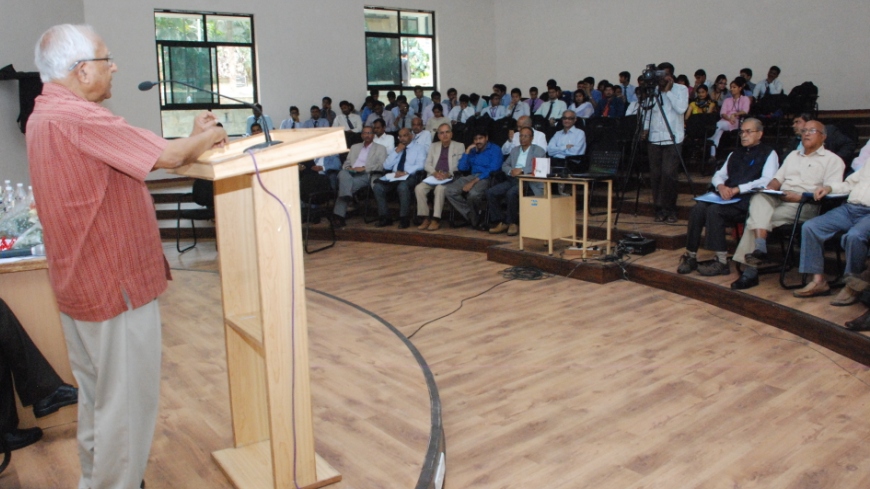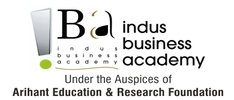
Workshop on Purusartha and Human Development
IBA Center for C School, Indus Business Academy (IBA),Bangalore
Two Dialogical Half-Day Workshops
Oct 18, 2011 at IBA Bangalore
Workshop 1
Topic: Purusartha and Human Development
Date: October 18, 2011
Time: 10 am to 1 pm
Venue: IBA, Bangalore
Purusartha was an important frame of life in classical India which talked about realization of meaning and excellence in terms of four cardinal values and goals of life – dharma (right conduct), artha (wealth), kama (desire) and moksha (salvation). It provided paths of human excellence and social frame in classical India. But its implication for human development and social transformations in the present day world has rarely been explored. This is not surprising as much of the vision and practice of human development is Euro-American and suffers from an uncritical one-sided philosophical and civilizational binding. But in our workshop, we wish to explore mutually transforming implications for dialogue between Purusartha and human development. We are challenged here to rethink both Purusartha and human development. In traditional schemes, Purusartha is confined to the individual level and rarely the challenge of Purusartha at the level of society has been addressed. In our conventional understanding elements of Purusartha such as dharma and artha are looked at in isolation. But we would have to overcome an isolated constitution of elements of Purusartha and look at them instead in a creative spirit of autonomy and interpenetration. Much of illness and ill-being both in traditional societies as well as in our contemporary ones emerges from isolation of these elements for example, artha (wealth) not being linked simultaneously to dharma (righteous conduct) and mokhsa (salvation). Similarly we are challenged to rethink vision and practices of human development which can learn from visions of Purusartha in creative ways in the process both opening Purusartha and human development to cross-cultural, cross-religious and cross-civilizational dialogues. For instance, it is helpful to explore what are the parallels of Purusartha in other religious and civlizational streams such as Christianity, Islam, Buddhism and Chinese civilizations.
Our dialogical exploration here is inspired by the seminal work of Daya Krishna, the inspiring philosopher, who tells us:
The development of new Purusarthas in the history of a culture or civilization would perhaps be one of the more important ways of looking at man’s history as it will emphasize ways of making his life significant in the pursuit of new ends of a different kind. [..] The emergence of any new Purusartha on the horizon of human consciousness should be seen as a breakthrough in human history, providing the possibility of a new kind of pursuit not available earlier.
We wish to explore what may constitute a new Purusartha for our times. We wish to submit practical spirituality which simultaneously addresses the challenge of food and freedom, anna and ananda, as one such possible Purusartha of our times. The new Purusartha of practical spirituality goes beyond a gendered fixation and helps us realize that our Purusartha lies in being creative mothers. There is a feminization of spirituality now where spiritual realization lies in our capacity to be mothers to ourselves, each other and society. Human development as human blossoming, collective self-realization and planetary realizations calls us to be mothers including making our society and state a space of mothering where society and state provide a space for self-realization as mothers and do not function only as spaces of control. This involves a reconstitution of both space and time as today much of our insecurity also emerges from an anxiety about time and being helpless victims of spaces of capital. A new Purusartha of practical spirituality reconstitutes space and time as our mothers but this reconstitution calls for transformation of capitalism and a new spiritual realization of our own capacity to generate time as mother and not only selling our time in the media of money and market. The new Pursuartha of practical spirituality transforms human security and social quality in the directions of human blossoming, inclusion of the other and planetary realizations.
In our workshop we explore the following themes:
- Purusartha: Its classical and contemporary meanings
- Purusartha and the Challenge of Cross-Religious and Cross-Civilizational Dialogues: Parallels of Purusartha in other Religious and Civilizational Streams
- Representation of Purusartha in Creative Literatures
- Purusartha and Human Development: Rethinking and Transformation
- Beyond Happiness Economics and the Calling of Anna (food) and Ananda (bliss)
- Rethinking Artha, Dharma, Kama and Moksha: Contemporary Challenges and Insights from Studies on Human Development
- Integral Development
- Purusartha and Human Development: Towards a New Yoga and Tantra of Human Development
Workshop 2
Topic: Literature, Human Development and Social Transformations: A Dialogue
Date: October 18, 2011
Time: 2 pm to 5 pm
Venue: IBA, Bangalore
Do not give me scissors,
Give me a needle to stitch
Since I do not cut.
– Baba Farid
Writing is a question of becoming, always incomplete, always in the midst of being formed..It is not the first two persons that function as the condition of literary enunciation; literature begins only when a third person is born in us that strips us of the power to say “I.” […] To write is also to become something other than a writer.
– Gilles Deleuze (1997), “Literature and Life” pp. 225, 230 (emphases added)
The new critics are critically aware. They are beginning to adapt themselves to the new fact that literature is not a special pursuit and this cannot be cultivated away from life, that it is very much a part of life and society. And what is more, it has not only to interpret life and society as they are, it has to probe deeper to find out why they are, what they are and upon that context, to suggest new directions and impetuses. This new criticism will not simply destroy; it will also fulfill and provide us with the next insights!
– Chittaranjan Das (1982a), A Glimpse into Oriya Literature.
In order to speak of a social pathology [..] we require a conception of normality related to social life as a whole. The immense difficulty involved in this project has been made evident by the failure of social-scientific approaches that have sought to fix the functional requirements of societies solely through external observations. Since what counts as a developmental goal or as normality is always culturally defined, it is only by a hermeneutic reference to a society’s self-understanding that social functions of their disorders can be determined. Thus we may have a defensive possibility of speaking of social pathologies within a culturally contingent notion of normality, since we can limit ourselves to an empirical description of what a given culture regards as a disorder. [..] A paradigm of social normality must, therefore, consist in culturally independent conditions that allow a society’s members to experience undistorted self-realization. [..] The question then becomes crucial whether it is a communitarian form of ethical life, a distance-creating public sphere, non-alienated labor or a mimetic interaction with nature that enables individuals to lead a well-lived life.
– Axel Honneth (2007), Disrespect: The Normative Foundations of Critical Theory, p.34, 35, 37, emphasis added
Reflections on literature, culture and society in contemporary India and various initiatives in literary and cultural criticism as they have been carried out in the academic portals of our land have deliberately chosen not to make a dialogue with movements of criticisms and creativity emanating from the soils and spaces of India, especially the non-metropolitan ones. Our theorists of literature and culture and our academic interpreters of life who have always claimed a larger than life role for themselves have almost always looked up to the West for direction and inspiration. Whatever emerges there— whether it is modernism or postmodernism, structuralism or post-structuralism—immediately arrests our attention. We rarely make an effort to rethink these theories and methods nor are we interested to carry on a dialogue with the reflections on the human condition emanating from different non-incorporated and non-metropolitan spaces of India. While discussing contemporary interlocutors such as Jacques Derrida, Michael Foucault, Gilles Deleuze and old masters such as Jean-Paul Sartre, we do not feel an urge to bring some of the creative and critical interlocutors from contemporary India to have a dialogue with these thinkers and thoughts and thus widen our universe of discourse. Even the so-called moves of post-colonial theory and criticism as they have come to pass in the institutional corridors of India and the West are part of a metropolitan reflection on the human condition and embody very little urge and desire to talk to people in their mother languages and have a dialogue with creative litterateurs and critics who choose to write in our mother languages (despite the temptations and the imperial gaze of the global).
In this context of the hegemony of the global and the decimation of the local, our workshop seeks to explore new horizons of literature, philosophy and social transformations that emerge from creative struggles from mother languages of India and in dialogue with liberatory perspectives from the whole world. This discusses the seminal contribution of Chitta Ranjan Das, a creative seeker, writer and experimenter from Odisha who just left his mortal body on Jan 16, 2011 as a prelude to a connected and much wider discussion on literature, philosophy, human development and social transformations. Today reflections on human development and social transformations rarely involve meditations on literature and cultural creativity. A case in point is the vision of human development offered by Amartya Sen. Sen talks about capability but there is very discussion on creativity by Sen though this is touched upon by his collaborator philosopher Matha Nusssbaum. In our workshop, we wish to pursue such issues.
